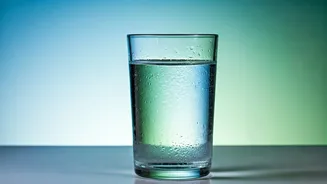Hydration's Vital Role
Water is undeniably crucial for life, forming the basis of nearly every bodily function. From transporting nutrients to regulating body temperature, its
significance is immense. In the realm of weight management, proper hydration plays a pivotal role. The sensation of thirst can sometimes be misinterpreted as hunger, leading to unnecessary calorie consumption. Drinking enough water can prevent this, thereby reducing overall calorie intake. Furthermore, water contributes to feeling full, which aids in controlling appetite and making healthier food choices. Regular water consumption also aids the kidneys in flushing out waste products, promoting overall metabolic efficiency. For optimal benefits, it's recommended to drink water consistently throughout the day, rather than in large quantities at once. Individuals often discover that their bodies function better, with improved energy levels and clearer skin, as hydration becomes a consistent part of their daily routines. It's a simple yet effective strategy for supporting overall health and well-being, which is especially important for those focusing on weight loss.
Myth-Busting Metabolism
The metabolism is a complex process, often surrounded by misconceptions. One common myth is that drinking cold water significantly boosts metabolism to the point of substantial weight loss. While the body does expend a small amount of energy to warm cold water, the effect on overall metabolism is minimal. The basal metabolic rate (BMR), the energy needed for basic functions like breathing and circulation, is influenced by several factors, including genetics, age, and muscle mass, but not significantly by water temperature. However, maintaining adequate hydration is undeniably linked to efficient metabolic function. Dehydration can impair metabolic processes, making it harder for the body to burn calories effectively. By staying adequately hydrated, you can support your metabolism and ensure it functions optimally. Focusing on hydration, balanced nutrition, and regular physical activity provides a more sustainable approach to supporting a healthy metabolism, and consequently, weight management. Simply put, water's impact on metabolism is more about optimizing its function than providing a drastic boost.
Thermogenesis Unveiled
Thermogenesis, the process of heat production in the body, plays a role in energy expenditure. Drinking warm water might contribute slightly to thermogenesis because the body uses energy to bring the water to its core temperature. However, the impact is generally considered negligible when looking at overall calorie burn. Some studies propose that drinking warm water could aid in fat burning by potentially activating the sympathetic nervous system, which governs the 'fight or flight' response. This activation might lead to a slight increase in metabolism and caloric expenditure. While these effects might be subtle, they are part of the broader context of how hydration affects the body. Considering that consistent hydration is important for various bodily functions, including digestion and nutrient absorption, drinking warm water can aid in the overall process of weight management. Ultimately, focusing on consistent hydration, alongside a balanced diet and exercise, offers a more practical approach to promoting effective thermogenesis and overall health, while understanding the limits of the impact of water temperature on the process.
Warm Water Benefits
While the impact of warm water on direct weight loss might be modest, its potential advantages extend beyond just that. Drinking warm water can help soothe the digestive system, promoting better digestion and nutrient absorption. Many people find that warm water is gentler on their stomach than cold water, potentially reducing discomfort after meals. Furthermore, warm water can improve circulation, helping the body to function more efficiently and possibly aiding in detoxification. It can also help relieve congestion. Incorporating warm water into your daily routine is a simple, healthy habit. Drinking it at different times of the day, such as first thing in the morning or before meals, might enhance its benefits. It can also be combined with other health practices, like mindful eating or regular exercise. The key is consistency and ensuring you are prioritizing adequate hydration. Prioritizing warm water is one aspect, when combined with other healthy habits, it supports overall well-being, potentially influencing weight management positively.












